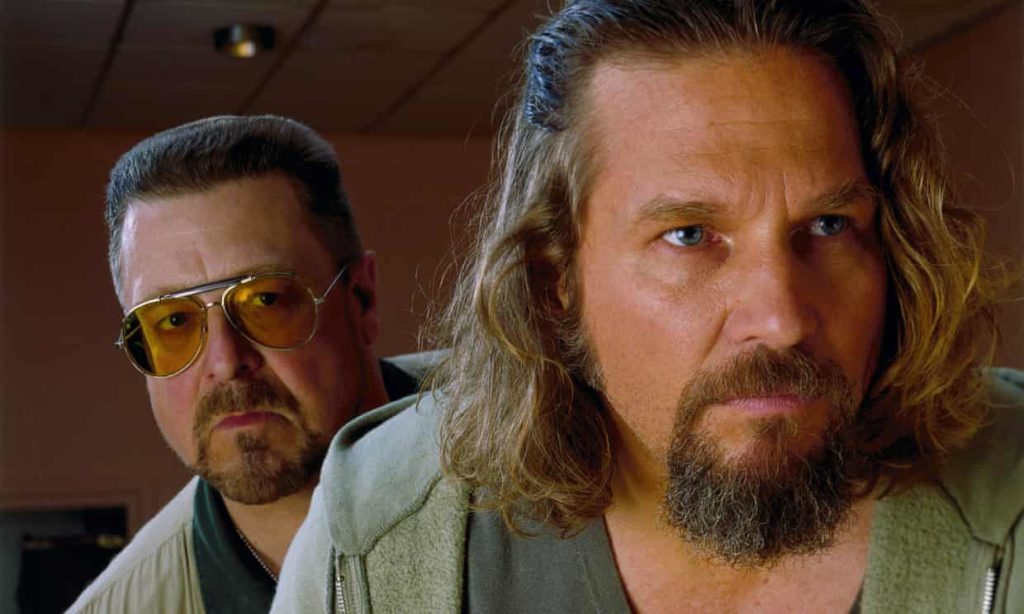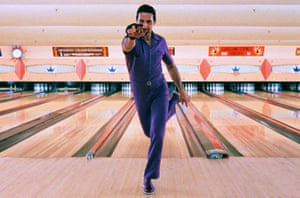Peter Bradshaw @PeterBradshaw1

Originally posted: Thu 20 Sep 2018 10.00 BSTLast modified on Mon 24 Sep 2018 14.14 BST
After 20 years, the shaggy-dog stoner LA noir that may be the Coens’ comic masterpiece rolls back on to the big screen, as light and insouciant as the tumbleweed from the old west that drifts incongruously up to the city in the opening sequence. In fact, after two decades, the film looks weirdly less shaggy, less dishevelled to me: sleeker, sharper, more integrated and with more menace, more mystery. (I found myself thinking of Thomas Pynchon and of David Lynch’s Mulholland Drive). Sam Elliott’s basso profundo narrator, topping and tailing the action and appearing enigmatically in the middle, creates a fascinating residue of unease. But there are just as many laughs.
Our sub-Chandleresque hero is Jeffrey “the Dude” Lebowski, unforgettably played by Jeff Bridges: a younger or more lightweight actor would have made this character seem merely silly. He is a man whose plot function is so close to that of the classic private eye that he is mistaken for one by another private eye late on in the film.

The Dude is, in fact, a former 60s radical and political activist who casually claims to have written an early and uncompromised draft of the Port Huron Statement, but is now permanently at ease, wearing a dressing gown, sunglasses and athleisure-pyjamas combo with flip-flops indoors and out. He is passionate about just one thing – bowling. The Dude is in a team with a couple of other slackers: belligerent Vietnam veteran Walter Sobchak (John Goodman) and easygoing Donny Kerabatsos (Steve Buscemi), and they are preparing to face off against some hated rivals, led by the arrogant but brilliant bowler and convicted paedophile Jesus Quintana (John Turturro).
One day, a couple of thugs mistakenly rough up the Dude because a wealthy LA plutocrat with the same name has a high-spending young wife who owes them some money. The Dude goes to see this other “Big” Lebowski (David Huddleston) in high dudgeon to demand some kind of reparation, meeting his uptight private secretary (Philip Seymour Hoffman) and then the alluring younger spouse Bunny (Tara Reid). It is a chaotic situation from which a financial opportunity arises: Bunny is kidnapped and Mr Lebowski hires the Dude as his bagman to deliver the ransom money. The arrangement descends into anarchy.
There is something inspired in the way that the Coens have access to a kind of fantasy-trance state that is always close by. Bowling has a lot to do with it, more than weed, even: not merely the lighter-than-air sense of triumph that accompanies a perfect strike, but the weird and hidden world beneath the bowling alley, where the balls go, where the skittles go, how they are miraculously reconfigured every time. An occult pattern under the everyday world.
There are wonderful fantasy sequences where the Dude flies through the air, like Christopher Reeve’s Superman, the twinkling lights of the city beneath him, and also some great Hollywood musical sequences featuring Mr Lebowski’s beautiful but prickly daughter Maude – a tremendous performance from Julianne Moore.
The audience experiences the Dude’s state of unjudging discombobulation as we and he drift from strange scene to strange scene. There’s a terrifically charged performance from Ben Gazzara as sinister porn mogul Jackie Treehorn; he could have come from an entirely serious film, though of course there’s a sense in which this film is itself entirely serious. On one of the many occasions on which he is beaten up, the Dude contrives not to spill his drink, keeping the glass upright as he rolls around on the asphalt: “Hey! There’s a beverage here!”
It’s a great performance from Bridges, and he seems weirdly young in this film, certainly compared to the brilliant craggy oldsters that later became his acting birthright. You can still see the boyish, vulnerable figure that he was in Peter Bogdanovich’s The Last Picture Show. One of a kind.